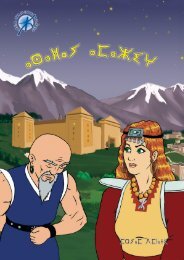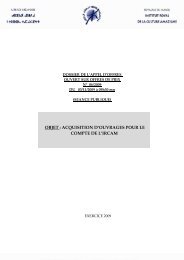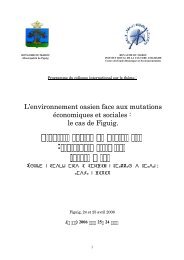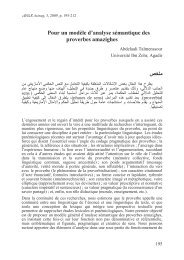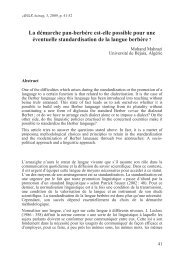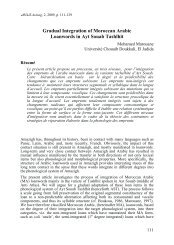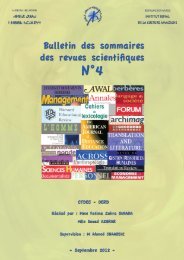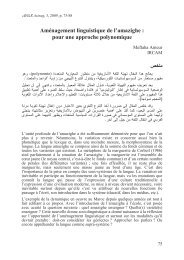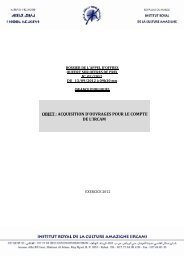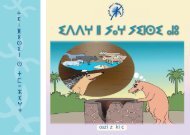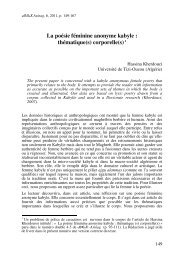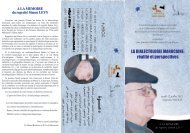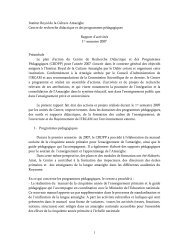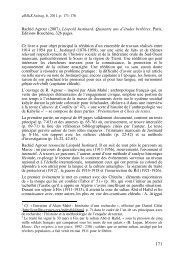Presentation of IRCAM - Institut Royal de la Culture Amazighe
Presentation of IRCAM - Institut Royal de la Culture Amazighe
Presentation of IRCAM - Institut Royal de la Culture Amazighe
Create successful ePaper yourself
Turn your PDF publications into a flip-book with our unique Google optimized e-Paper software.
<strong>Presentation</strong> :<br />
The <strong>Royal</strong> <strong>Institut</strong>e <strong>of</strong> the Amazigh <strong>Culture</strong> (Fr<br />
Fr : <strong>IRCAM</strong>)<br />
The <strong>IRCAM</strong>, in conformity with the provisions <strong>of</strong> the articles <strong>of</strong> the Dahir <strong>de</strong>aling<br />
with its creation and organisation, is an aca<strong>de</strong>mic institution which is “endowed<br />
with full legal competence and financial autonomy” (Article1). It is un<strong>de</strong>r the<br />
direct authority and tute<strong>la</strong>ge <strong>of</strong> His Majesty the King. Its mission is to provi<strong>de</strong> His<br />
Majesty with “advice about the measures that are likely to preserve and promote<br />
the Amazigh culture in all its expressions” (Article 2).<br />
The <strong>Institut</strong>e is ma<strong>de</strong> up <strong>of</strong> an administrative structure (comprising the Board <strong>of</strong><br />
Trustees, the Rectorate, the General Secretariat and other <strong>de</strong>partments and services)<br />
and <strong>of</strong> an aca<strong>de</strong>mic structure (comprising different centres and research units).<br />
The <strong>IRCAM</strong> is a scientific research institute which carries out and publishes studies<br />
on the Amazigh <strong>la</strong>nguage and culture. It is run by a Rector, helped by a General<br />
Secretary (at the administrative level). Its creation comes as the satisfaction <strong>of</strong> one <strong>of</strong><br />
the <strong>de</strong>mands <strong>of</strong> the Amazigh Cultural Movement in Morocco.<br />
In addition to preserving and promoting the Amazigh <strong>la</strong>nguage and culture, its<br />
main mission lies in contributing to the implementation <strong>of</strong> the policies adopted by<br />
His Majesty, policies “which will allow for the introduction <strong>of</strong> the Amazigh in the<br />
educational system and ensure the spread <strong>of</strong> its influence in the social, cultural,<br />
media, national, regional and local contexts” (Article 2).<br />
This contribution <strong>of</strong> the <strong>IRCAM</strong> should be in col<strong>la</strong>boration with governmental<br />
bodies and institutions concerned by the aforementioned fields. Furthermore, its task<br />
is to “reinforce the status <strong>of</strong> our Amazigh culture…” in these spaces, as well as in<br />
“the management <strong>of</strong> local and regional affairs” (Motive n° 8). To this end, the<br />
<strong>IRCAM</strong> has, as concerns the scientific level, seven research centres and<br />
administrative <strong>de</strong>partments (see the Organisational Chart below).<br />
The <strong>Institut</strong>e <strong>of</strong>ficially started its work at the end <strong>of</strong> July 2002. The first ordinary<br />
session <strong>of</strong> its Board <strong>of</strong> Trustees took p<strong>la</strong>ce on July 25 th and 26 th , 2002. The Board’s<br />
task lies in <strong>la</strong>ying out the general orientations <strong>of</strong> the <strong>Institut</strong>e which will be put in<br />
concrete form through the scientific research carried out within the different centres.<br />
The beginning <strong>of</strong> the <strong>IRCAM</strong>’s activities on August 27 th , 2002 had been prece<strong>de</strong>d by<br />
a period <strong>of</strong> reflection followed by the e<strong>la</strong>boration <strong>of</strong> the organising texts (Nov.2001-<br />
June 2002), texts which <strong>de</strong>al with the administrative as well as the aca<strong>de</strong>mic<br />
conception and organisation <strong>of</strong> the <strong>Institut</strong>e, i.e. the Internal Regu<strong>la</strong>tions and Staff<br />
Status.<br />
In addition to the missions assigned to it on the national level, the <strong>IRCAM</strong> should<br />
<strong>de</strong>velop cooperation with international and foreign institutions and organisations,<br />
working in the field <strong>of</strong> its interest. Its ambition is to progressively become an<br />
institution that serves as a reference in the field <strong>of</strong> the Amazigh <strong>la</strong>nguage and culture<br />
at the national, North African and international levels.
Organisational Chart<br />
Administrative Structure<br />
<br />
Board <strong>of</strong> Trustees<br />
Presi<strong>de</strong>ncy : The Rector<br />
Committees :<br />
• The special Committee for Nominations and<br />
Representations.<br />
• Permanent and Provisional Committees.<br />
o The Committee for Financial and Administrative<br />
Affairs and for the Budget.<br />
o The Committee for Cultural, Scientific and<br />
Educational Affairs and for Communication.<br />
o Ad Hoc Committees (set up when necessary).<br />
<br />
Administration <strong>of</strong> the <strong>Institut</strong>e<br />
The Rector<br />
The Administrative Committee.<br />
The General Secretariat.<br />
Department <strong>of</strong> Human Resources and General Affairs.<br />
• Staff Affairs Office<br />
• General and Legal Affairs Office<br />
Department <strong>of</strong> the Budget, Accounts and Equipment<br />
• The Budget and Management Accounts Office<br />
• Accounting Office<br />
• Equipment and Logistics Office
Aca<strong>de</strong>mic Structure<br />
<br />
The Rector.<br />
The Scientific Committee<br />
The General Secretary (Reporter)<br />
The Research Centers :<br />
• The Center for Language P<strong>la</strong>nning:<br />
o RSU in Lexical Development ;<br />
o RSU in Grammar.<br />
• The Center for Didactic Research and Educational<br />
Programs:<br />
o RSU in Didactic Research ;<br />
o RSU in Educational Programs.<br />
• The Center for Historical and Environmental Studies:<br />
o RSU in Historical Studies ;<br />
o RSU in Environmental Studies.<br />
• The Center for Sociological and Anthropological Studies:<br />
o RSU in Sociological Studies ;<br />
o RSU in Anthropological Studies.<br />
• The Center for Artistic Studies, Literary Expressions and<br />
Audiovisual Production<br />
o RSU in Artistic Studies<br />
o RSU in Drama and Audio-Visual Production<br />
• The Center for Trans<strong>la</strong>tion, Documentation, Publishing and<br />
Communication:<br />
o RSU in Trans<strong>la</strong>tion ;<br />
o RSU in Information and Communication ;<br />
o RSU in Documentation, Publishing and<br />
Distribution.<br />
• The Center for Informatics Studies, Information Systems and<br />
Communication:<br />
o RSU in Information Systems and Networks ;<br />
o RSU in Information Management and<br />
Communication.<br />
(This Document is e<strong>la</strong>borated and trans<strong>la</strong>ted by Pr<strong>of</strong>. A. CHAÂBIHI)



